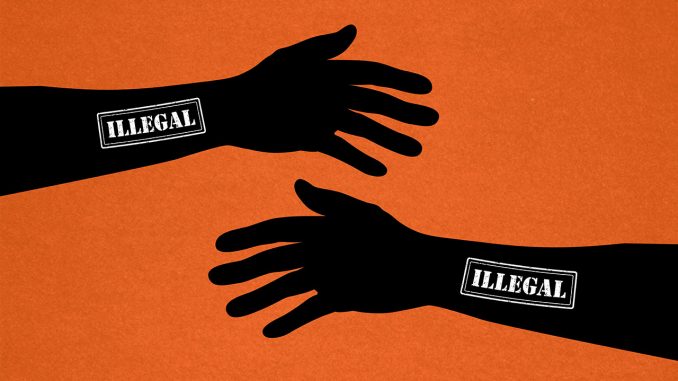

President Donald Trump held a rally in Kentucky on Saturday where he spoke about immigration — using his usual phrases like “criminal aliens” and “most vile, most vicious people on Earth” to refer to immigrants.
This doesn’t come as a surprise, as he frequently uses this derogatory rhetoric at rallies, on social media and in interviews.
Still, this makes me upset for immigrants seeking refuge the U.S. And I’m afraid that with the constant negative attitude of our country’s leader comes more discrimination against them.
The U.S. is “the top destination for international migrants since at least 1960,” according to the Migration Policy Institute, a nonprofit think tank based in Washington, D.C.
Of the foreign-born people who moved into the U.S. in 2016, 175,100 of them came from India, 160,200 came from China or Hong Kong and 150,400 came from Mexico. Many migrate to escape violence, poverty or persecution, according to Global Citizen.
Talking about human beings like this is wrong, and it’s important to acknowledge how much our country truly needs immigration. We should treat people with respect, especially those who risk their lives crossing the border, seeking a better life.
Kevin Fandl, a legal studies professor and former senior counsel to the assistant secretary at U.S. Immigration and Customs Enforcement, said calling people “illegal” is demeaning.
“It’s likely to be used in a means to discriminate,” Fandl said. “The problem with [the term ‘illegal’] is it describes an action rather than a person. …It suggests that they’re a criminal.”
Many people are not aware of this, though. Or maybe they’re just ignorant of it. We need to start looking beyond the headlines and our president’s tweets and do our own research about the immigration process.
Generally, someone who wants to be a U.S. citizen must apply for a green card first, which means being considered a legal resident, then apply for naturalization, according to AllLaw, an online legal guide. This comes with several fees, and even a slight application error can delay the process. It may take six months or more.
To apply for citizenship, the applicant must have lived in the U.S. for at least five years after acquiring a green card or permanent residence, according to the U.S. Citizenship and Immigration Services. They must know the English language unless exempt, and some U.S. history. If they pass the citizenship test and interview, it can take another two years to take oath as a new citizen.
Between application fees and background check costs reaching about $725, this process requires funds that many people seeking asylum do not have. The entire naturalization process takes at least five years, and in some situations, it could be much longer.
Rather than trying to send these people back, we should welcome them with open arms and encourage them to tell their stories.
I was born in the U.S., but I know the country I call home was founded on immigration. Indigenous people make up less than two percent of the entire U.S. population, according to the U.S. Census Bureau. So, many people expressing xenophobic opinions are likely descendants of European immigrants themselves.
Joshua Klugman, a sociology and psychology professor, said the U.S. has a substantial number of jobs that non-immigrants don’t want, which can be filled by people who have immigrated here.
“We have a lot of low-skill jobs that need to be filled that aren’t being filled by native born Americans,” Klugman said. “So in some ways, it’s hypocritical because we’ve set up this system where we have these jobs that can only be filled by [undocumented immigrants], and yet we demonize them.”
It’s time to stop demonizing and turning away people who are here to contribute to our society. By voting for representatives who take a pro-immigration stance, we can help to take the right steps toward welcoming new people into our country.
Regardless of whether they came into this country the authorized way or not, it’s dehumanizing to refer to an immigrant as “illegal.” While their journey to the U.S. may have been unlawful, a human being is not a crime.
The country we have now wouldn’t be enriched or diverse without immigration. We should try to walk a mile — or hundreds of miles — in an immigrant’s shoes before making assumptions about situations most of us couldn’t imagine.


Be the first to comment